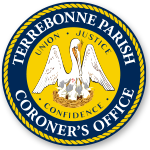
|
|
Terrebonne Parish Coroner
Patrick D. Walker, M.D.

Frequently Asked QuestionsRequirements for Reporting Deaths to the Office of Coroner
|
Contact
Hours of Operation
Physical Address
Mailing Address
|
Resources
|
|
Connect
|
|
©2024 Terrebonne Parish Consolidated Government
5045 |